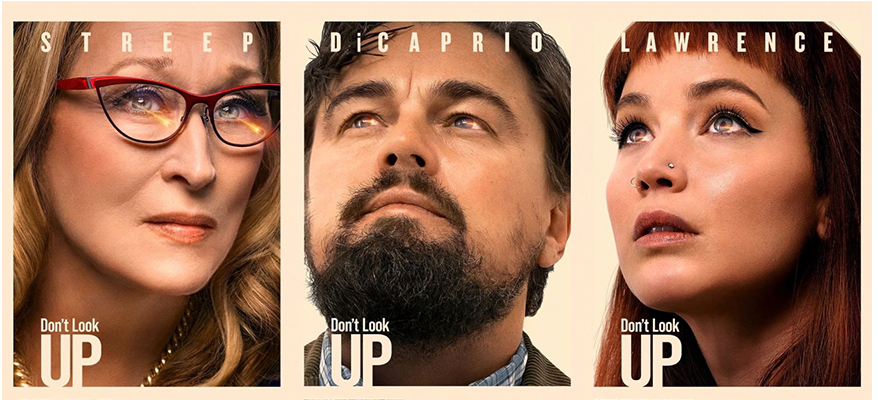
I heard the buzz about the movie Don’t Look Up. The sci-fi plot intrigued me.
Two astronomers spot a Mount Everest-size comet on course to hit Earth in six months. It’s bigger than the astroid that wiped out the dinosaurs 65 million years ago. This comet will obliterate all planetary life—unless something is done. And soon.
I figured the movie would be good since it was directed by Adam McKay (Anchorman) and featured a star-studded cast. So I watched it. It was good but not great.
Dr. Strangelove (1964) was funnier. The Day After (1983) was scarier. An Inconvenient Truth (2006) was more sobering.
Still, despite some sophomoric moments, Don’t Look Up conveys a serious message: BE AFRAID. Be afraid of what can destroy the planet. And be afraid of humankind’s ignorance and apathy. Wake up before it’s too late!
Madam President, a comet will hit Earth in six months and destroy all life.
How certain are you?
Ninety-nine percent.
Well, that’s not one-hundred percent. So there you go. I have more important things to do.
And so it goes. Until …
I was raised on apocalypticism. As I child I heard preachers proclaim that Jesus was coming back very soon to rapture born-again Christians into heaven. Everybody else would be left behind to endure great tribulation. (This is—weirdly—called “The Blessed Hope.”)
In grade school I did duck-under-the-desk drills in case a nuclear bomb hit. For Y2K I stored water and canned food.
None of us are immune to apocalyptic fears. It’s in our collective DNA.
Once upon a time God told Noah to build an ark. A deluge was coming, and all life on the planet would be destroyed. It’s a morality tale: Those who ignored or denied the dire warning perished.
That mythic tale is followed by another: “The Tower of Babel.”
Once upon a time all humans gathered to build something great, a tower reaching toward heaven. They nearly succeeded until the gods inflicted them with “babbling” tongues. Suddenly they couldn’t understand each other.
“So they stopped building.” (One of the saddest verses in the Bible.)
Traditionally, Babel is considered a morality tale about human hubris. I see it differently. I see it as a story of hope: When humans cooperate we can accomplish great things.
We have. And we can.
But can is not will.
_______________________
See Paula’s photo (Oregon Seastacks) on the home page. Posted January 23.




Yes, we can… Together. It remains to be seen what WE will do.
Praying for the light & love that is so abundant to awaken us & show is a way forward… In gratitude for all the beauty & gifts available & all around us. 🙏🏼💓
We have all the evidence we need to observe the different outcomes that result when fear is the motivator (be it gods’ or politicians’) vs. Love as motivator, and stories aplenty to remind us. I’m thinking that when we humans cooperate to achieve a common goal, we ARE demonstrating that we understand one another. These conditions ensure that we CAN and we WILL. Love, not fear.
I remember buying an oil burning railroad lantern from Jay Hurley at a Y2K fair being held at the “Men’s club” in 1999. I didn’t really believe that all the computers were going to shut down and bring the world economy to a screeching halt…but it was a good deal on an oil burning railroad lantern.
Ahhhh, but the work of drawing us together engages all the best parts of us. Acting in concert is our greatest and most important challenge.
Too true (…’can is not will’.) Thank you for another great overview of the human condition. Re “Don’t Look Up”,star-studded casts are, for me, a warning that something will be lacking in the story, the plot, the film itself.
Can is not lost because it shows the image we need to exercise our will. Fight fear with faith, the lanterns will help, the structures will survive and together we can execute our faith.
I’m going to sound kind of woo-woo here, but I’ve been getting very discouraged about climate change and lots of other things about our society, and the passing of Thich Nhat Hanh got me to thinking – not to give up on God’s creation, certainly, but maybe if we focused less on our material surroundings and more on achieving awareness of and practicing the spiritual values he lived by, some of these other things would become less daunting. Of course, we still have to keep the comet from hitting!
I agree about the movie…disappointing…like teen aged boys (Okay and maybe some girls) run the movie industry now….“Oh and then let’s have a big bird bite Meryl Streep’s head off! haha” Awful. and poor great actors to have to endure. Message was there though… still. I loved your comments…better than the movie. Carry on.